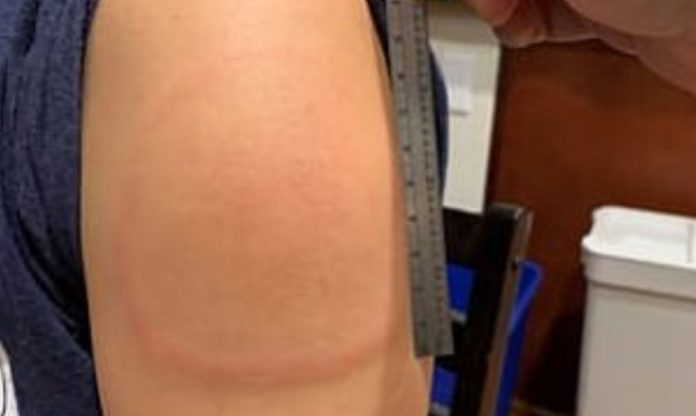So far, millions of people have been vaccinated and reports of serious side effects, such as allergic reactions, have been very rare. But doctors highlight that appearing of red rashes on the skin after getting the Covid-19 vaccine may be a positive sign of recovering from Covid.
Richard Terrell, 74, from Virginia, US, was given the Johnson and Johnson vaccine on March 6 and within days developed an itchy rash all over his body.
- Scientists in Fear of This New Predator From Red Sea Eating Native Species in Mediterranean
- Does This Mean We Stopped Being Animal and Started Being Human Due to ‘Copy Paste’ Errors?
- The One Lifestyle Choice That Could Reduce Your Heart Disease Risk By More Than 22%
- Aging: This Is What Happens Inside Your Body Right After Exercise
- Immune-Boosting Drink that Mimics Fasting to Reduce Fat – Scientists ‘Were Surprised’ By New Findings
When the blotchiness wouldn’t die down, he was taken to ER and doctors confirmed the skin condition had been caused by the vaccine which had sparked a ‘frenzied’ activation of his immune system.
A mum in Scotland has suffered a similar reaction to getting the AstraZeneca jab in the UK but experts have reassured people that all jabs currently being used are safe and effective.
Richard spent five days in hospital and is still recovering his strength but says he has no regrets about getting jabbed.
He told WRIC: “It all happened so fast. My skin peeled off. It was stinging, burning and itching.”
“Whenever I bent my arms or legs, like the inside of my knee, it was very painful where the skin was swollen and was rubbing against itself.”
Some rashes and skin irritations have been associated with the Covid vaccine. But other, more established vaccines for conditions such as teanus and chickenpox, can also cause a similar reaction.
Medics say the benefits of getting inoculated far outweigh the risks.
Richard’s doctor, Fnu Nutan, said she suspected that her patient may have some rare genetic traits that interacted with some of the vaccine ingredients and triggered the painful reaction.
She said: “If you look at the risk for adverse reaction for the vaccine it’s really, really low. We haven’t seen a great concern at all. I am a big proponent of the vaccine.”
Meanwhile, mum Leigh King, 41, from Wishaw, near Glasgow, has described how she is still in pain two weeks after getting the AstraZeneca vaccine.
She told the Wishaw Press her body broke out in a burning rash shortly after being jabbed at the Ravenscraig supercentre.
Leigh said: “My skin was so sore and constantly hot. I have never felt
pain like this it has been a horrible experience.”
“I am a very healthy person and am not on any medication or anything
like that. I am not even in a vulnerable category.”
“I only got the vaccine as I am an unpaid carer for my son who has
autism and mobility issues.”
“I haven’t even been able to care for him since I got the vaccine as I
am in such pain.”
Leigh went to A&E three times and is currently waiting to see a skin specialist to determine exactly what happened.
She said her experience hasn’t diminished her faith in the vaccine but has called for the NHS to offer more follow-up care and wants people to be aware of potential side-effects.
- Scientists in Fear of This New Predator From Red Sea Eating Native Species in Mediterranean
- Does This Mean We Stopped Being Animal and Started Being Human Due to ‘Copy Paste’ Errors?
- The One Lifestyle Choice That Could Reduce Your Heart Disease Risk By More Than 22%
- Aging: This Is What Happens Inside Your Body Right After Exercise
- Immune-Boosting Drink that Mimics Fasting to Reduce Fat – Scientists ‘Were Surprised’ By New Findings
A spokesperson said: “The vaccines approved for use in the UK have met strict standards of safety, quality and effectiveness set out by the independent Medicines and Healthcare products Regulatory Agency (MHRA).”
In fact, Dr Peter Chin-Hong, a professor of medicine and infectious disease specialist at the University of California, San Francisco, says such a reaction is an indication that your body is ramping up to prevent a potential infection in the future.
Chin-Hong said the reactions shouldn’t be a cause of concern but rather a ‘celebration.’
“First cause for celebration is the reaction that you’re feeling is your immune system working and getting ready to protect you,” he said.
“The second cause for celebration is it goes away and doesn’t really linger.”
The official term used by dermatologists and allergists to describe the side effect is “delayed cutaneous hypersensitivity.”
However, he did say that if people don’t experience the reaction, there’s no cause for panic because in clinical trials, half the participants didn’t experience any side effects.
- Scientists in Fear of This New Predator From Red Sea Eating Native Species in Mediterranean
- Does This Mean We Stopped Being Animal and Started Being Human Due to ‘Copy Paste’ Errors?
- The One Lifestyle Choice That Could Reduce Your Heart Disease Risk By More Than 22%
- Aging: This Is What Happens Inside Your Body Right After Exercise
- Immune-Boosting Drink that Mimics Fasting to Reduce Fat – Scientists ‘Were Surprised’ By New Findings
“From the most common to things not related to the vaccine, it’s a hell of a lot easier to get something and deal with it in a temporary basis rather than the longer acting effects of COVID and the uncertainty of how sick you’ll get and the potentially long hauler syndrome, where you’ll have symptoms linger for months and months and months,” he said.
